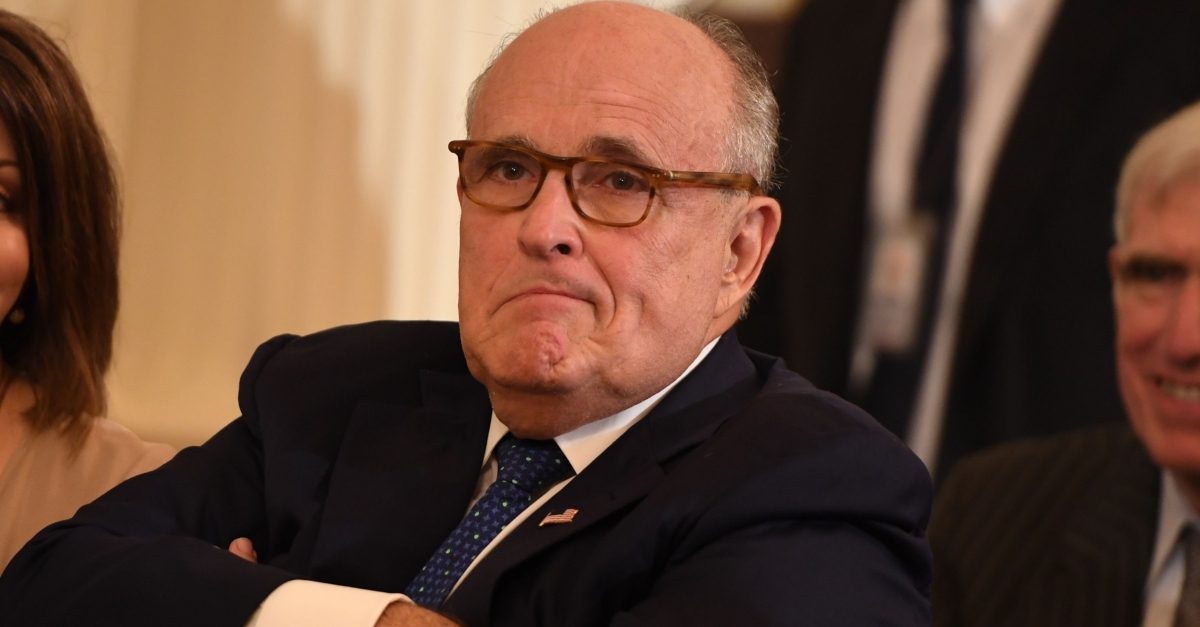
Authorities seized 18 electronic devices from Rudy Giuliani and employees of his firm during the raid on his Manhattan apartment late last month, newly unsealed portions of a government letter reveal.
The letter, a more complete version of the same filing made public earlier this month, provides unprecedented insight about the scope and duration of the Southern District of New York’s scrutiny of Giuliani and his fellow pro-Trump lawyer Victoria Toensing, a conservative attorney and TV personality who has been said not to be a target of the government’s investigation.
Citing “unusually sensitive privilege issues” involved in probing the communications of two lawyers tied to former President Donald Trump, prosecutors have asked U.S. District Judge J. Paul Oetken to appoint a special master to sift through the data. Judge Oetken ordered the release of its current version on Thursday. Federal prosecutors’ longstanding interest in Giuliani and Toensing’s communications has been long known, but the newly unsealed portions of April 29 letter signed by Manhattan U.S. Attorney Audrey Strauss and several assistant U.S. attorneys provided additional details, like the dates and breadth of the government’s search warrants, including “covert” ones from late 2019.
“On April 28, 2021, the Government seized 18 electronic devices belonging to Giuliani and certain employees of Giuliani Partners pursuant to those warrants,” read newly unredacted portions of the letter. “On April 22, 2021, the Government sought and obtained warrants in the District of Maryland, pursuant to Rule 41, to search premises belonging to Victoria Toensing and seize certain electronic devices. On April 28, 2021, the Government seized one electronic device belonging to Toensing pursuant to those warrants.”
The April 28 search warrants were not the first warrants granted in the investigation of Giuliani, the unredacted portions of the letter confirm.
Comparing the high-profile search of Giuliani’s apartment to the raid previously carried out on the home of former Trump attorney Michael Cohen, prosecutors contended that “exceptional circumstances” were present when searching through files of an attorney, particularly one that has represented the President of the United States. In order to ensure that any subsequent search of such material was above reproach, prosecutors suggested that a special master would “promote the perception of fairness” more than a review conducted by a government “filter team.”
The previously redacted sentence fragment from that argument made a direct comparison to steps taken by investigators at a similar junction in the Cohen and Giuliani probes, saying that the government filter team, “in [the Cohen] case, like here, had previously reviewed records from email accounts obtained pursuant to covert search warrants.” (Emphasis added).
The existence of earlier search warrants that were executed on Giuliani and Toensing were further confirmed by the “Discussion” section of the letter—almost half of which had previously been blacked-out—which clarified that a filter team had already been used to sort through online communications obtained from the two attorneys since at least 2019.
“As the Court is aware from the Government’s prior search warrant applications, and consistent with the general practice in this District, the Government has used a filter team to review and exclude potentially privileged communications from email and iCloud accounts belonging to Giuliani and Toensing that were seized pursuant to prior warrants,” the letter stated.
The letter also disclosed the dates when the court issued search warrants for the attorneys’ online communications, stating that there was a Nov. 4, 2019 search warrant “for iCloud accounts belonging to Giuliani and Toensing” and a Dec. 13, 2019 warrant for “an email account belonging to Toensing.” The time periods covered by those warrants remained redacted, meaning it’s unclear how far back investigators were permitted to look, but prosecutors appeared confident that most of the information on the seized electronic devices would be duplicative of the material already obtained through searches conducted under the prior warrants.
“Based on the Government’s investigation to date, given the overlap in date range and because certain materials, including certain emails and text messages, were backed up to the iCloud accounts that were searched pursuant to these prior warrants, the Government expects that some, but not all, of the materials present on the electronic devices seized pursuant to the Warrants could be duplicative of the materials seized and reviewed pursuant to the prior warrants.”
The existence of the “covert” warrants were reported earlier and discussed in a recent filing by Giuliani’s lawyers made public earlier this week.
In a separate letter submitted to the court on Sunday that was also unsealed Thursday, Strauss said that the latest redactions were agreed to after prosecutors conferred with the attorneys representing Toensing and Giuliani.
“The redactions are narrowly tailored to protect the Government’s ongoing grand jury investigation and third party privacy interests by redacting specific information related to the applicable warrants, while permitting very general information about the warrants to be unredacted,” Strauss wrote.
Giuliani’s lawyer Robert Costello declined to comment beyond the legal team’s already publicly available response.
Read the newly redacted letter below:
[image via Saul Loeb/AFP/Getty Images]